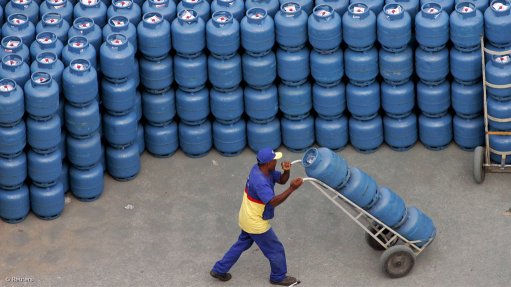
INDUSTRIAL ROLEMODEL
Liquefied petroleum gas industry could play a strategic role in the establishment of a gas economy as key lessons can be learnt from this industry
Photo by: Reuters
Key factors that will influence the establishment of a gas economy in South Africa include the passing of the amended Mineral and Petroleum Resources Development Act (MPRDA) and greater clarity regarding the expected and stated imports of liquefied natural gas (LNG), says South African Oil and Gas Alliance CEO Niall Kramer.
Speaking at the Africa Liquefied Petroleum Gas Summit, held in Johannesburg last month, he suggested that the MPRDA, when passed, would be a key enabler for the economy, stating that South Africa is a “frontier market”, as it had not started any gas exploration of scale.
Kramer, however, asserted that the Act should be commercially viable and attractive to the gas industry.
“This year is a critical year for South Africa to progress in establishing a gas economy,” he said, noting that he would like to see LNG being imported through the allocated three ports – Richards Bay, Coega and Saldanha.
“That, in one sense, would start a gas economy of large scale.”
He cited Turkey and the US as countries that had success with developing gas industries, with Turkey having increased the use of gas in its energy mix, which contributed to significant growth, while there was a significant economic impact on employment, the fiscus and gross domestic product growth in the US from shale gas.
Similarly, Kramer believes that it is “happy hour” for LNG, as the world is “awash with LNG”.
He further suggested that the liquefied petroleum gas (LPG) industry could play a bigger strategic role in the establishment of a gas economy, with key lessons to be learnt from the LPG industry.
The industry has been the subject of study in the Competition Commission’s LPG market enquiry, with areas studied and recommendations made on aspects that include access to markets, market behaviours and pricing, as well as policy and regulatory alignments.
Kramer suggested that, for the LNG industry, there were key factors to be aware of, such as access to markets for smaller independent players.
The LNG industry could also gain insight from the LPG market regarding the transportation of gas, as “all the discussions have been on transporting . . . gas through actual pipelines and not through virtual pipelines or [by means of] smaller tankers by way of road or rail”, he said, asserting that the LPG industry had the expertise in this area.
Other lessons to be learned from the LPG gas industry included issues around safety.
Further, the scalability of the industry could merit discussion, Kramer said, noting that, while the assumption was that “big is always good”, the LPG industry was a perfect example of a scalable industry.